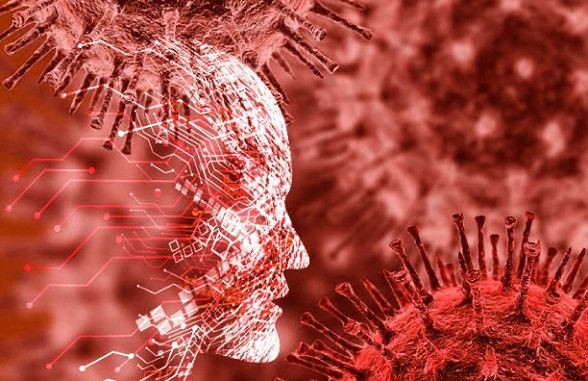Nikhil Prasad Fact checked by:Thailand Medical News Team Feb 02, 2025 2 months, 1 week, 4 days, 3 hours, 9 minutes ago
Medical News: Over the past few years, the field of pathogen genomic surveillance has taken significant strides, particularly in response to the COVID-19 pandemic. Scientists around the world have worked tirelessly to track the evolution of viruses by sequencing their genetic material. This ongoing research is critical in understanding how viruses change over time and how they adapt to different environments, including human hosts. As new technologies emerge, artificial intelligence (AI) is now being integrated into this field to enhance genomic surveillance, making the process more efficient and accurate.
 Revolutionizing Pathogen Surveillance with Artificial Intelligence
Revolutionizing Pathogen Surveillance with Artificial Intelligence
A groundbreaking study conducted by researchers from The University of Tokyo, the MRC-University of Glasgow Centre for Virus Research, the School of Computing Science at the University of Glasgow, and several other institutions explores how AI-driven protein language models (pLMs) are transforming pathogen genomic analysis. These AI tools can process vast amounts of genomic data, helping scientists predict how viruses might evolve and how they could potentially evade immunity. This
Medical News report delves into the study’s findings and explains how these advancements could shape the future of infectious disease research and public health preparedness.
The Role of AI in Understanding Viral Evolution
Traditionally, genomic surveillance involves collecting virus samples, sequencing their genomes, and analyzing the data using computational methods. However, these methods are time-consuming and require significant resources. AI-based models, particularly protein language models, provide a faster and more efficient way to analyze viral genetic data. These models operate similarly to natural language processing tools but instead of analyzing human language, they study protein sequences.
In the study, the researchers applied AI-driven pLMs to analyze genomic data from SARS-CoV-2, the virus responsible for COVID-19. One of the key findings was that these AI models can predict how changes in viral proteins affect the virus’s behavior. For example, they can identify mutations that may enhance transmissibility, immune evasion, or resistance to treatments. By integrating AI into genomic surveillance, scientists can monitor viral evolution in real-time and respond more quickly to emerging threats.
Key Findings of the Study
One of the most significant aspects of the research was how AI models were used to analyze SARS-CoV-2 variants. The study found that:
-AI-driven pLMs can accurately predict how specific mutations in viral proteins impact the virus’s ability to spread and evade immune responses.
-These models can detect patterns in viral evolution that traditional methods may miss, providing a deeper understanding of how viruses adapt.
-The use of AI allows for more efficient analysis of large datasets, which is crucial in global surveillance efforts.
-The models can be trained on different viral proteins, making them applicable to a wide range of pathogens beyond SARS-CoV-2.
By using AI to study genomic changes, researchers were able to gain insights into the functional and structural changes of the virus. This could lead to the development of better vaccines and antiviral treatments, as scientists will have a clearer understanding of how a virus is likely to evolve.
The Surveillance Future of AI in Disease
While the study focused on SARS-CoV-2, its findings have broader implications for other infectious diseases. Many viruses, including influenza, HIV, and emerging zoonotic viruses, constantly mutate. AI models can help predict these changes and guide public health responses.
The researchers emphasize that AI should not replace traditional genomic surveillance but rather complement it. AI models rely on high-quality data, meaning that continued investment in sequencing efforts is necessary.
Additionally, collaboration between computational scientists, virologists, and public health experts will be key to maximizing the benefits of AI-driven genomic surveillance.
Another promising aspect of AI in pathogen surveillance is its potential to identify new viruses before they become widespread. By analyzing genetic sequences from different species, AI models can predict which viruses have the highest potential for human transmission, allowing scientists to take preventive measures before an outbreak occurs.
Challenges and Ethical Considerations
Despite its potential, integrating AI into pathogen surveillance comes with challenges. One major concern is ensuring that AI models are trained on diverse and comprehensive datasets. Bias in data collection could lead to inaccurate predictions, which could have serious public health consequences. Additionally, the ethical implications of AI-driven surveillance need to be carefully considered.
Questions about data privacy, transparency, and equitable access to AI technology must be addressed to ensure that these advancements benefit all populations, particularly those in resource-limited regions.
The study also highlights the importance of acknowledging data contributors, particularly those who provide genomic data from underrepresented regions. To build truly effective AI models, researchers must ensure that sequencing efforts are globally inclusive and that all stakeholders have access to the tools and insights generated from AI-driven research.
Conclusion
The integration of artificial intelligence into pathogen genomic surveillance represents a major leap forward in our ability to monitor and respond to infectious diseases. The study conducted by leading research institutions demonstrates how AI-driven protein language models can enhance our understanding of viral evolution, improve disease forecasting, and support public health decision-making.
By leveraging AI, scientists can analyze vast amounts of genetic data more efficiently, allowing for quicker responses to emerging threats. However, continued investment in sequencing infrastructure, interdisciplinary collaboration, and ethical considerations are essential to fully realize the potential of AI in genomic surveillance.
The study findings were published in the peer-reviewed journal: Journal of Virology.
https://journals.asm.org/doi/10.1128/jvi.01601-24
For the latest on AI-in-Medicine, keep on logging to Thailand
Medical News.
Read Also:
https://www.thailandmedical.news/news/ai-based-blood-diagnostics-accurately-identifies-long-covid-in-children
https://www.thailandmedical.news/news/using-artificial-intelligence-to-predict-long-covid-outcomes
https://www.thailandmedical.news/news/ai-brings-hope-for-better-glaucoma-diagnosis-and-treatment
https://www.thailandmedical.news/articles/ai-in-medicine
